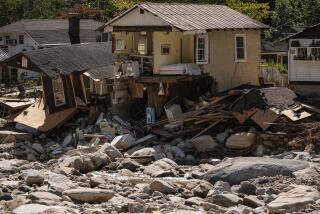Katrina was also a media disaster
- Share via
Last week, according to LexisNexis, there were more than 2,000 newspaper and wire stories on Hurricane Katrina, along with blanket coverage on cable news. This newspaper alone ran no less than two dozen articles of one kind or another around the two-year anniversary of the worst natural disaster ever to hit the United States.
This hurricane of hurricane retrospectives was no doubt long in the works, as editors like to put stories “in the can” for vacation time. The media seemed to cover every angle, particularly the Bush administration’s missteps in response to the disaster. And while some might quibble with this or that characterization or selection of facts, ultimately the media were doing what they’re supposed to do: hold government accountable.
But there was one thing missing from the coverage of this natural, social, economic and political disaster: the fact that Katrina represented an unmitigated media disaster as well.
Few of us can forget the reports from two years ago. CNN warned that there were “bands of rapists, going block to block.” Snipers were reportedly shooting at medical personnel. Bodies at the Superdome, we were told, were stacked like cordwood. The Washington Post proclaimed in a banner headline that New Orleans was a “A City of Despair and Lawlessness,” insisting in an editorial that “looters and carjackers, some of them armed, have run rampant.” Fox News anchor John Gibson said there were “all kinds of reports of looting, fires and violence. Thugs shooting at rescue crews.”
TV reporters raced to the bottom to see who could moralistically preen the most. Interviewers transformed into outright scolds of administration officials. Meanwhile, the distortions, exaggerations and flat-out fictions being offered by New Orleans officials were accelerated and amplified by the media echo chamber. Glib predictions of 10,000 dead, and the chief of police’s insistence that there were “little babies getting raped,” swirled around the media like so much free-flowing sewage.
It was as though journalistic skepticism of government officials was reserved for the White House, and everyone else got a free pass.
Of course the Bush administration made serious mistakes -- politically, logistically and otherwise -- in a difficult situation. But Katrina unleashed a virus of sanctimony and credulity for urban legends almost without precedent.
Reports of the Superdome being a slaughterhouse were repeated, even though dozens of news organizations had access to the building. CBS alone had 200 people in New Orleans, and yet it couldn’t find those bodies stacked to the ceiling or a single rape victim from the roving bands of “Mad Max”-style marauders. That’s because nobody was raped or murdered in the Superdome.
The deluge in New Orleans elicited a deluge of wish-fulfillment in the media, as though the hurricane was a biblical sign that something was very wrong in George W. Bush’s America. “Everything changed” because of Katrina, insisted CNN’s Anderson Cooper. Translation: We’re going to tell the story we want to tell about the country from now on. Race and class become the chief prisms for viewing the disaster. Katrina was portrayed as the result of global warming, which (of course!) is Bush’s fault.
During last week’s bonfire of Katrina navel-gazing, there was virtually no mention of the hyperventilating and inaccurate media reports, even though this newspaper and the Times-Picayune (among others) received accolades for debunking the hysteria less than a month after the hurricane. Yet last week’s saturation coverage contained little or no mention of the media’s malpractice. It’s as if it never happened.
Why? I think the answer is complex, but three factors are surely involved. One, the media are often good watchdogs of government but rarely of themselves. While recycling old complaints about government is permissible, dwelling on your colleagues’ failures -- or your own -- just isn’t done.
Two, the media have convinced themselves that they did a wonderful job covering Katrina. Dan Rather spoke for his colleagues when he said “everybody across the board did such a good job.” It was one of the “quintessential great moments in television news . . . right there with the Nixon-Kennedy debates, the Kennedy assassination, Watergate coverage, you name it.”
And, lastly, journalists are invested in the dominant narratives of Katrina, and they’ll be damned if they’ll let go, particularly if it comes at the expense of their own credibility, or make Bush’s mistakes seem a little less horrendous.
No, it would be better, and much easier, to print the legend.
More to Read
The biggest entertainment stories
Get our big stories about Hollywood, film, television, music, arts, culture and more right in your inbox as soon as they publish.
You may occasionally receive promotional content from the Los Angeles Times.











